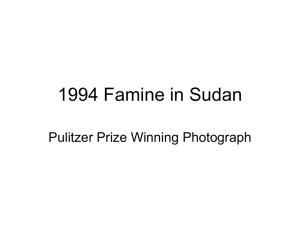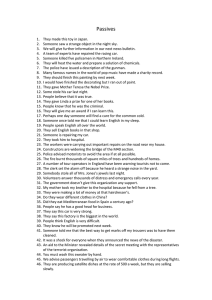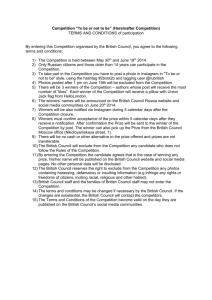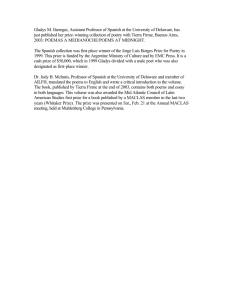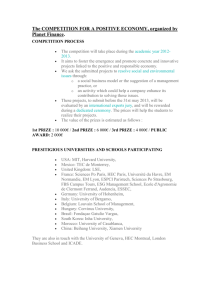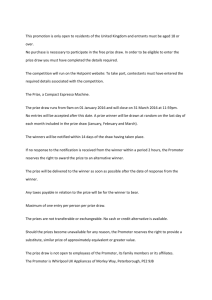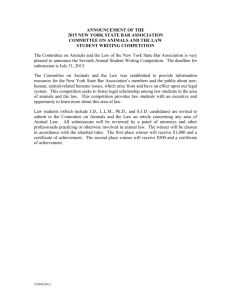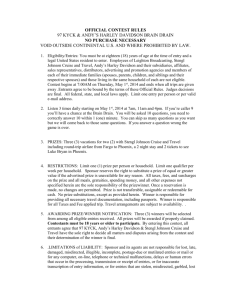Six poems to mark the end of daylight saving time.doc
advertisement
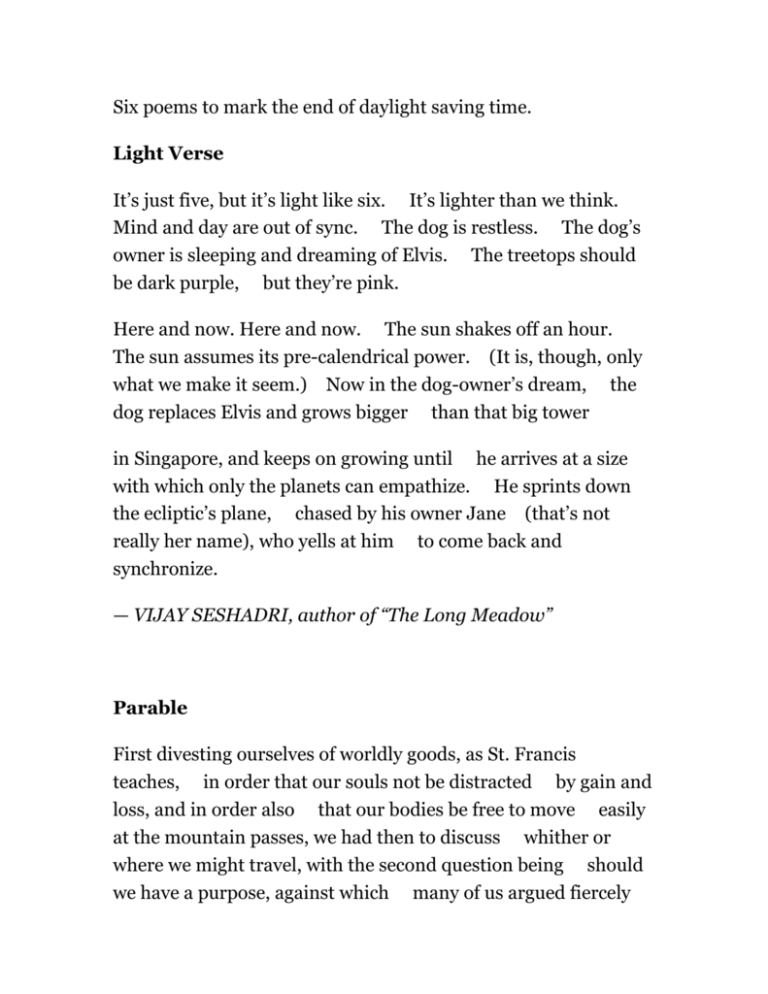
Six poems to mark the end of daylight saving time. Light Verse It’s just five, but it’s light like six. It’s lighter than we think. Mind and day are out of sync. The dog is restless. The dog’s owner is sleeping and dreaming of Elvis. The treetops should be dark purple, but they’re pink. Here and now. Here and now. The sun shakes off an hour. The sun assumes its pre-calendrical power. (It is, though, only what we make it seem.) Now in the dog-owner’s dream, the dog replaces Elvis and grows bigger than that big tower in Singapore, and keeps on growing until he arrives at a size with which only the planets can empathize. He sprints down the ecliptic’s plane, chased by his owner Jane (that’s not really her name), who yells at him to come back and synchronize. — VIJAY SESHADRI, author of “The Long Meadow” Parable First divesting ourselves of worldly goods, as St. Francis teaches, in order that our souls not be distracted by gain and loss, and in order also that our bodies be free to move easily at the mountain passes, we had then to discuss whither or where we might travel, with the second question being should we have a purpose, against which many of us argued fiercely that such purpose corresponded to worldly goods, meaning a limitation or constriction, whereas others said it was by this word we were consecrated pilgrims rather than wanderers: in our minds, the word translated as a dream, a somethingsought, so that by concentrating we might see it glimmering among the stones, and not pass blindly by; each further issue we debated equally fully, the arguments going back and forth, so that we grew, some said, less flexible and more resigned, like soldiers in a useless war. And snow fell upon us, and wind blew, which in time abated — where the snow had been, many flowers appeared, and where the stars had shone, the sun rose over the tree line so that we had shadows again; many times this happened. Also rain, also flooding sometimes, also avalanches, in which some of us were lost, and periodically we would seem to have achieved an agreement; our canteens hoisted upon our shoulders, but always that moment passed, so (after many years) we were still at that first stage, still preparing to begin a journey, but we were changed nevertheless; we could see this in one another; we had changed although we never moved, and one said, ah, behold how we have aged, traveling from day to night only, neither forward nor sideward, and this seemed in a strange way miraculous. And those who believed we should have a purpose believed this was the purpose, and those who felt we must remain free in order to encounter truth, felt it had been revealed. — LOUISE GLÜCK, winner of the Pulitzer Prize and author, most recently, of “A Village Life” How It Happens The sky said I am watching to see what you can make out of nothing I was looking up and I said I thought you were supposed to be doing that the sky said Many are clinging to that I am giving you a chance I was looking up and I said I am the only chance I have then the sky did not answer and here we are with our names for the days the vast days that do not listen to us — W.S. MERWIN, poet laureate of the United States and author, most recently, of “The Shadow of Sirius,” which won the Pulitzer Prize for poetry in 2009 The Green Flash le rayon vert And the sea’s skin heaves, saurian, and the spikes of the agave bristle like a tusked beast bowing to charge tonight the full moon will soar floating without any moral or simile the wind will bend the longbows of the arching casuarinas the lizard will still scuttle and the sun will sink silently with a stake in its eye bleeding behind the shrouding sail of a skeletal schooner. You can feel the earth cooling, you can feel its myth cooling and watch your own heart go out like the red throbbing dot of a hospital machine, with a green flash next to Pigeon Island. — DEREK WALCOTT, winner of the Nobel Prize in Literature in 1992 and author, most recently, of “White Egrets” Free I was always thinking about her even when I wasn’t thinking. Days went by when I did little else. She had left me one night as a complete surprise. I didn’t know where she went. I didn’t know if she was ever coming back. I searched her dresser and closet for any clues. There wasn’t anything there, nothing. No lotions or creams in the bathroom. She had really cleaned out. I thought back on our years together. They seemed happy to me. Summers on the beach, winters in the mountains skiing. What more could she want? We had friends, dinner parties. I walked around thinking, maybe she didn’t love me all that time. I felt so alone without her. I hated dinners alone, I hated going to bed without her. I thought she might at least call, so I was never very far from the phone. Weeks went by, months. It was strange how time flew by when you had nothing to remember it by. My friends never mentioned her. Why can’t they say something? I thought. I remembered every tiny gesture of her hand, every smile, every grimace. Birthdays, anniversaries — I never forgot. But then something strange started to happen. I started doubting every memory. Even her face began to fade. The trip to Majorca, was it something I read in a book? The jolly dinner parties, were they a dream? I didn’t trust anything any longer. I searched the house for any trace of her. Nothing. I started asking my friends if they remembered anything about her. They looked at me as if I were crazy. I sat at home and began to cheer up. What if none of this happened? I thought. What if there was nothing to be sad about? — JAMES TATE, winner of the Pulitzer Prize and author, most recently, of “The Ghost Soldiers” Lines Written in the Days of Growing Darkness Every year we have been witness to it: how the world descends into a rich mash, in order that it may resume. And therefore who would cry out to the petals on the ground to stay, knowing, as we must, how the vivacity of what was is married to the vitality of what will be? I don’t say it’s easy, but what else will do if the love one claims to have for the world be true? So let us go on though the sun be swinging east, and the ponds be cold and black, and the sweets of the year be doomed. — MARY OLIVER, winner of the Pulitzer Prize and author, most recently, of "Swan: Poems and Prose Poems"
